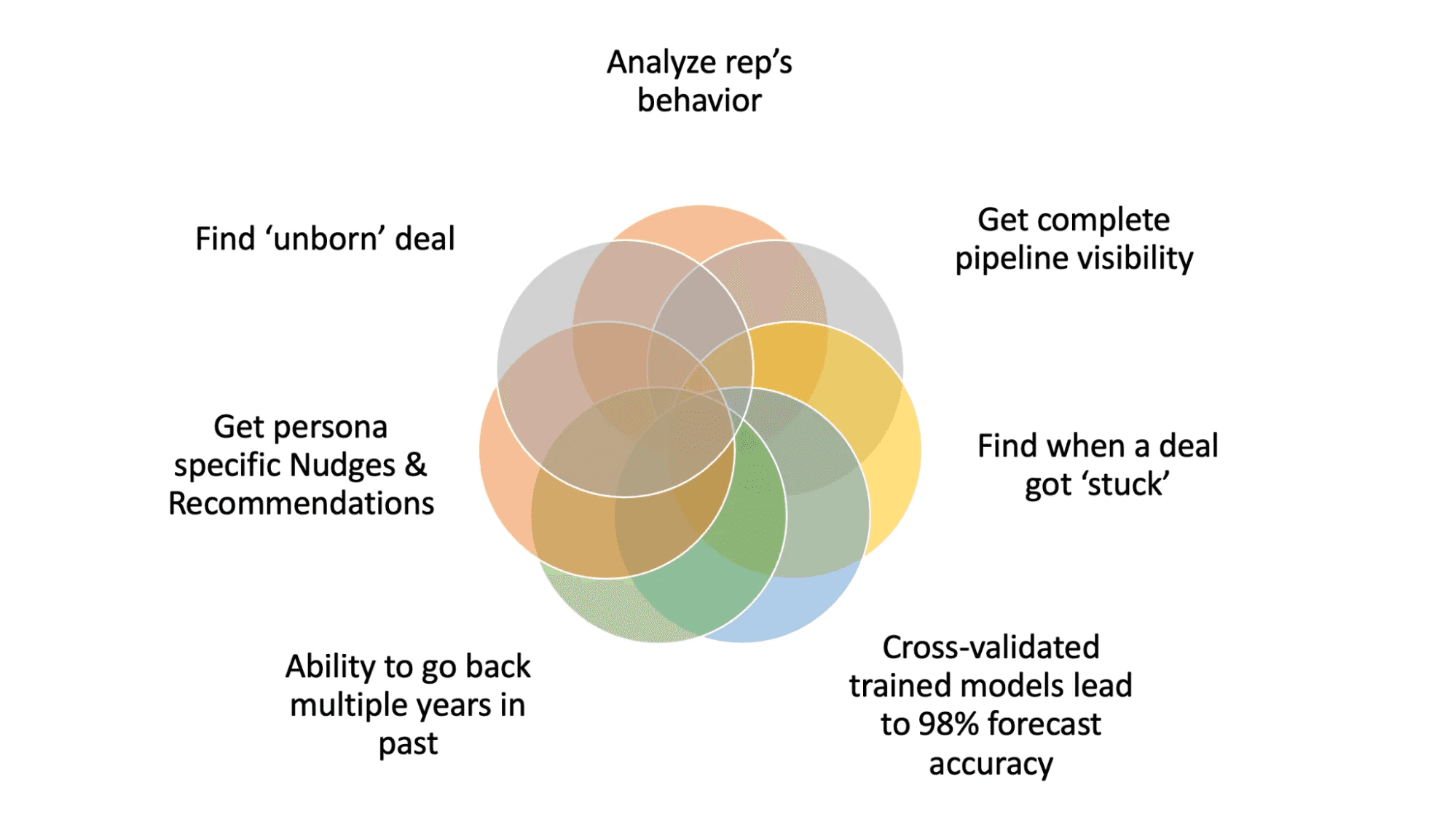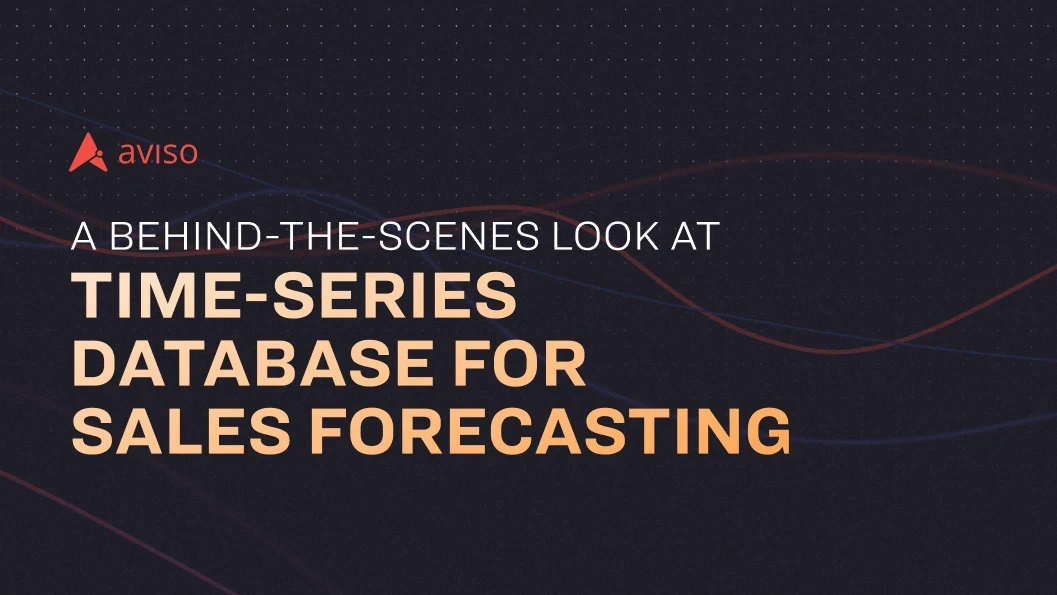A Behind-The-Scenes Look At Time-Series Database For Sales Forecasting
May 23, 2022
Sales forecasting is a complex problem to solve. To make accurate predictions, an organization must have the ability to efficiently store and provide access to large volumes of data. A time-series database is one way to ensure that this happens.
A time-series database is a system that is optimized for storing, retrieving, and managing data that are organized into sequences of events in chronological order.
The data points stored in time-series databases have a timestamp associated with them. This timestamp is used to track the changes over time.
Time-Series Database For Sales Forecasting
To be successful in the world of data, you need to be able to store and analyze it quickly. Most databases typically store information about the present state, ignoring the past. They see the data in its current form.
CRM lacks enough data for sophisticated AI and machine learning algorithms to model the business because it does not keep a complete history. Even if your salespeople are the best in the industry at entering data, certain CRMs restrict the number of fields you can track in history, limiting your capacity to capture the whole picture.
Let’s say a sales rep changes the close date of a particular deal in their CRM. If you are using static data, the database gets updated, and the old close date is no longer there. But to gain insights that are crucial for understanding deal closures, you need the ‘knowledge of evolution’ for any deal. For example- how many times was this deal pushed out? What was the extent of this push out? Remember, these are all essential factors impacting your likelihood of winning a deal. (Read our blog on “Do you think it is natural to push out a close date of an opportunity” to find out more!).
Time-series database helps you understand the evolution of a deal through its built-in support for handling time-sensitive data.
The Benefits Of Using A Time-Series Database
Time-series database helps revenue operations leaders analyse information in real-time and address problems as they arise. It also has the potential to predict future sales by analyzing past data and trends. A time-series database is useful because it is optimized for handling time-based data that changes over regular intervals. It can load data in seconds, while traditional databases take minutes or hours. The major advantage of time-series databases is the ability to store a large amount of data in a compressed form.
The benefits of using a time-series database for forecasting sales include:
Better accuracy in predictions
Ability to compare forecasts with actual results
Ability to see trends over time
Ability to see how the forecasted values change over time
Aviso’s Best-In-Class Time-Series Database
Our time-series database helps you drive more return on investment and see data maturation across channels, products and teams through the real-time collection and historical analysis of all disparate data sets generated during a sales cycle. (Read our blog on - How Aviso's time-series database helps Fortune 500 leaders win more deals).
This time-series approach makes it possible to look into a deal’s past quarters’ data, such as close date, stage, type, amount, etc. and predict owner win rate, account win rate, amount which would be won and coverage ratio for the current quarter.

Aviso keeps taking the pulse of a deal to know how healthy it is!
More than features from CRM, it is derived features that provide accurate insights about the deal's health. Aviso leverages its time-series database to extract relevant features of a deal that have a good correlation with what happens from the perspective of winning or losing that deal. For instance, if we are trying to predict the risk of churn, we can use the information from some of the simplistic features around the time of last purchase or frequency of engagement. In reality, most businesses have hundreds of relevant features depending on the velocity, the size of the deal, and the product line, that are correlated and are essential for predicting the win score or highlighting the risk.
As new customers are onboarded, Aviso’s machine learning algorithms discover the most predictive features for that customer and build an ensemble of models. Different forecasting models are tested and evaluated to pick the most efficient one. Predictions from these models are generated and published daily as insights, nudges, and team-wide actions. These insights are tailored to the needs of different hierarchies or roles — a sales rep will get customer-specific insights, a sales manager will get team-specific insights, and a revenue leader will gain insights for the entire business.
Know more about Aviso’s proprietary time-series architecture - Download our whitepaper.
How Aviso’s Time-Series Database Helps Sales Users
Aviso’s ability to analyze and access insightful time-stamped data helps revenue operations leaders make informed decisions and gives key insights at your fingertips.

Analyze rep’s behavior — Aviso’s proprietary time-series database allows historical tracking of past meetings, emails, calendars, and CRM data to supercharge the custom insights. It combines what reps say (from conversations) with what they do (from email/calendar/contacts) and what they want you to see (from CRM) to learn which behaviors drive success for your organization.
Find out when a deal got stuck — With a time-series approach, you benefit from going back in the past and navigating through the issues and strategies of a stuck deal to determine when it’s time to change your approach versus deprioritize a deal. For instance, if a deal sits in a stage for 30-40 days, you can look for patterns to understand what other teams did in the past.
Get real-time pipeline visibility — Aviso surfaces pipeline analytics to support pipeline building and help understand if a good mix of deals supports the pipeline coverage to hit quota with greater certainty. The time-series database allows us to pinpoint exactly how, when, and where a pipeline changed so teams can prevent and remedy deal slippage.
Find Unborn deals— Predict the “unborn” deals which are yet to be created and won in the quarter.
Manage deals effectively — With our time-series approach, get insights related to historical win rates for comparable deals, top factors that go beyond the basics of what makes deals comparable, most likely close date windows, etc.
Receive timely nudges — Time-series database helps provide timely nudges, which in turn increases sales productivity. These nudges and weekly digests provide custom notifications about pipeline shifts, next best actions, and deal risk to all revenue team members.
Get 98%+ forecast accuracy — Finally, our time-series database helps in easy backtesting of our models and see how new model types or feature selection techniques provide gains over a wider past period. And essentially, what we end up with is an optimal model that gives you a 98+% forecast accuracy.
Interested in knowing how Aviso’s time-series database can help you stay ahead of the game. Book a demo now!







